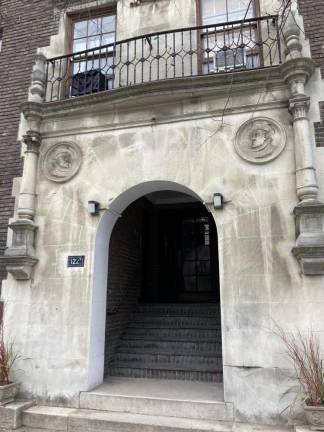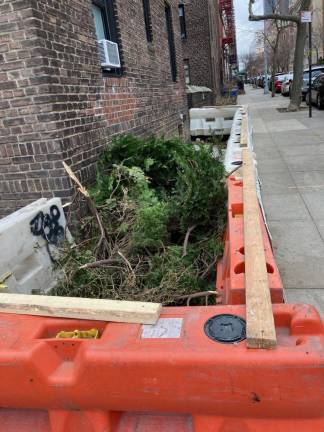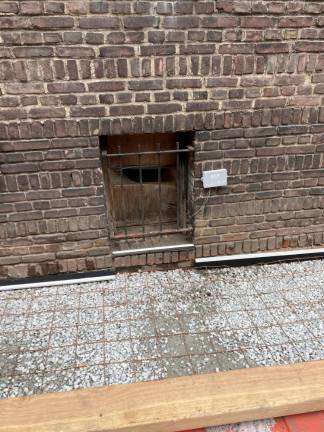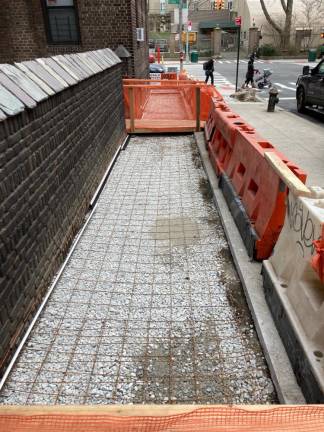Paving Over the Gardens of Socony Hall
Residents dispute owner’s cure for a rat infestation, but the clash is part of a decade-long saga of struggles over the landmarked building on York Avenue




Residents of Socony Hall, a landmarked residential building at 1221 York Avenue, were upset to discover in February that the gardens in the courtyard and surrounding their historic building were being demolished. The building, owned by the Stahl Organization, was constructed in 1906 and was designated landmark status by the city in 1990 due to their “light-court model tenement” design, which was an innovation in low-income housing at the turn of the century. The one-block long, six-story model avoided dark and airless tenement-style towers to create abundant light, airflow and green space for working class residents. Stahl acquired the property, which contains 190 units in 1977 for over $5 million.
Stahl claimed that the 20-30 foot gardens that encircle the 64th and 65th Street sides of the building were contributing to a rat infestation that was plaguing the building. The gardens had been planted by residents during COVID and were being maintained by tenants as well. “There was no notice made to the tenants about the demolition,” Anne Teicher, a longtime resident claimed in an interview. “We received a memo under our doors on February 1 that workers were going to be doing ‘concrete repairs’ on the building, but it said nothing about landscaping.”
“We have responded to tenant complaints about rats and advised them of our ceaseless efforts to end the problem,” said Brian Maddox, a spokesperson for Stahl and the building complex. “Experts in pest control have attempted repeatedly without success to exterminate the rats that have been penetrating the building. The experts have now told us that rats have been burrowing through the garden and that the solution is to permanently block the rats from burrowing in by sealing the garden with concrete. For the sake of health and safety we are following their advice.”
Maddox said that the green spaces of the gardens and courtyards would be replaced with trees and bushes in planters, but some tenants like Teicher say that the loss of the garden as an amenity is grounds for filing a rent reduction.
Latest Step
But the issues with the gardens are merely part of a decade-long saga of struggles between tenants and Stahl that date back to the building’s being designated a city landmark in 1990. Tenants allege that this latest step in addressing the issue of the rat infestation is disingenuous of Stahl, given the history of tenants’ grievances.
“They aren’t paving over the gardens to get rid of rats, they’re paving over the gardens to make the building ugly,” said Molly Weiss, a resident who grew up in the building. “Our gardens are our last green space, but the windows in the basement are completely open to rats, but Stahl has done nothing about it.”
Monica McLaughlin started a tenants’ association for all 15 buildings that make up Stahl’s Socony Hall complex, and the adjacent property between 64th and 63rd on York that has a similar history of complaints against the real estate company. In 2014, with the help of Council Member Ben Kallos and State Senator Liz Krueger, Ms. McLaughlin brought an HP action against Stahl for repairs. In addition, the tenants’ association filed for rent reductions to the rent regulated building on the basis of scaffolding that had been left up around the building for several years and for broken and outdated laundry machines, leading Stahl to spend over $100,000 to update the buildings laundry room. “The standard excuse tenants were given when they complained was that the building was landmarked so Stahl couldn’t change anything,” McLaughlin claimed.
Maddox was adamant, however, that Stahl is serious about improving the property for their tenants: “We field any and all complaints about construction and do our utmost to respect the quality of life of our tenants.”
When city inspectors came in 2016, 350 violations were filed with the city for the 30 out of 90 units in the building that were occupied. Stahl quickly got to making repairs to their property after they were issued a court order to repair the violations which included mold, missing smoke detectors, doors that didn’t close properly, chipping paint, holes in walls and rotting wood.
Claims of Unit Warehousing
Another source of grievance for tenants of the two Stahl properties has been allegations of unit warehousing: “429 East 64th and 430 East 65th are 80% vacant,” McLaughlin alleges. “Stahl originally wanted to tear these buildings down to put up luxury high rises.”
Stahl has repeatedly in the past sought to fight the city’s decision to grant landmark status to the two buildings. In 2006, Stahl petitioned for work permits to change the façade of the First Avenue Estates to remove the turrets from the building, moves that were seen by tenants as attempts to make the buildings less attractive and not warranting of their landmark status. In 2010, Stahl applied to the Landmarks Preservation Committee to demolish the buildings. The hardship application alleged that the building’s landmark status on the rent regulated buildings made it impossible for Stahl to receive any reasonable financial returns for owning the buildings. The City of New York rejected Stahl’s petition in 2014, and Stahl appealed the court’s decision in 2016, with the New York County Supreme Court rejecting the appeal.
In response to claims of unit warehousing, Maddox stated: “The vacant apartments are available for rent and we hope to rent them. We have a rental office on the premises and are open to all tenants.”
Kallos stressed that unit warehousing had devastating impacts on the Upper East Side community: “Stahl is arguing that if they continue to rent at the rent regulated rate they wont make their money back while their property is left empty. This is a self-inflicted wound. Stahl’s current plan is to let the building deteriorate as much as possible while waiting out the current tenants.”
Kallos stated that if Stahl needed assistance from the city to renovate the units and retrofit them, as they were found to contain outdated and antiquated appliances, the city would subsidize it, but he doubts that they truly lack the funds to bring about such changes: “I’m willing to fund litigation to take the building from Stahl and give it to a non-profit or committee land trust. Stahl shouldn’t have been allowed to let these units sit vacant for 30 year and if it isn’t illegal, it should be.”
“Our gardens are our last green space, but the windows in the basement are completely open to rats.” Resident Molly Weiss